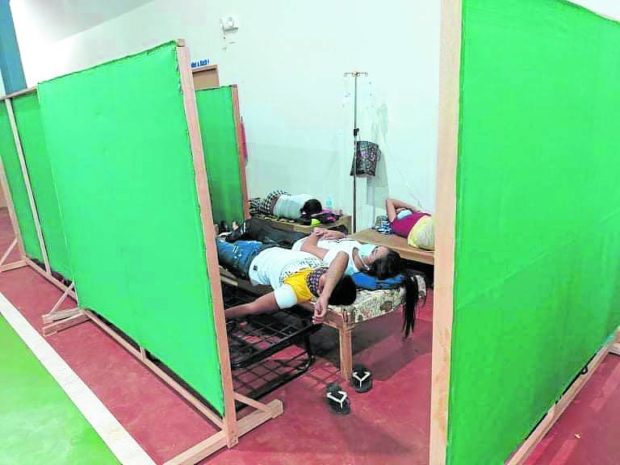
The local government of Caraga town in Davao Oriental has converted a COVID-19 quarantine facility into a makeshift hospital to attend residents stricken with diarrhea, later confirmed to a cholera outbreak. (Photo by ROMY ELUSFA)
CARAGA, Davao Oriental, Philippines — As the cholera death toll climbs to six and cases surge to more than 500 here, the Sangguniang Bayan has yet to declare the town under state of calamity to usher in the release of funds that would address the outbreak and provide relief to those affected.
Caraga Vice Mayor Melody Anne Benitez on Monday said they had been awaiting the transmittal of the recommendation from the Local Disaster Risk Reduction and Management Council (LDRRMC) since early last week so they could place the town under a state of calamity but the document has not been forwarded to them.
“We knew the mayor knew about the outbreak on Monday; we learned that the LDRRMC was convened on Friday afternoon. But until now, we’ve been waiting for them to furnish us the copy. By operation of law, we needed that document so that we could declare the town under state of calamity, we are committed to do that,” she told the Inquirer by phone.
She said the declaration of the state of calamity would usher in the release of some P14 million from the town’s 70-percent quick response fund.
“This concerns people’s lives,” the vice mayor said, “We are committed to come up with the declaration as soon as we get the necessary document.”
Puzzled
The Inquirer tried but failed to contact Mayor Alicia Benitez Mori for comment. Dr. Chris Anthony Limen, municipal health officer of Caraga, told the Inquirer in a separate phone interview that he was also puzzled why until now the SB still failed to place the town under a state of calamity.
Limen said the town urgently needed to set up temporary impounding stations in strategic places to treat and disinfect water for use in households as cholera cases here surged to 516, killing at least six people as of Monday, including an 11-month-old baby.
The impounding stations would ensure that the water dispatched to the households would already be treated and disinfected to address the problem of the contaminated water that had caused the cholera outbreak.
Since the first diarrhea cases were recorded on Jan. 29, Limen said they were actively doing surveillance in the community to find cholera patients and to see to it that people no longer drink from their faucets to control the outbreak.
—REPORTS FROM GERMELINA LACORTE AND ROMY ELUSFA
READ: Diarrhea outbreak hits 350, killing one, in Davao Oriental barangay